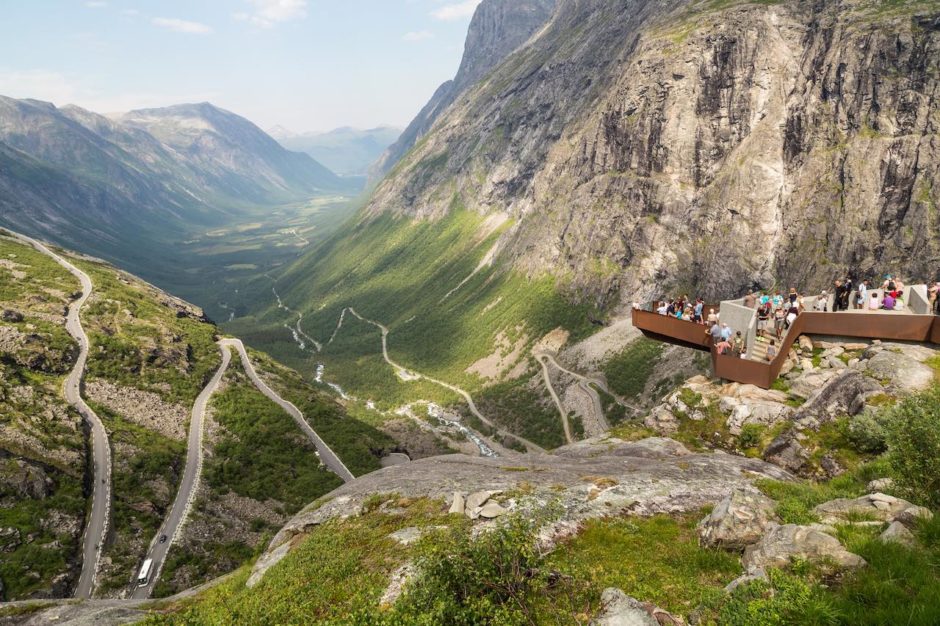- Ireland
- Ref.FandBIE1018

The Kingdom of Norway is a constitutional monarchy in Northern Europe that occupies the western part of the Scandinavian Peninsula. Its area is 385 991 km², of which 361 243 km² of land and 24 748 km² of water.
The country is the most Northern in Europe and is famous with its beautiful mountains and fjords.
Norway is a very highly industrialized country and one of the richest in the world. It is in the leading places in the world on standard of living, life expectancy and health.
Norway is not a member of the European Union (EU), but is a member of the EU Common Market as a member of the EEA and the European Free Trade Association (EFTA).
The official language is Norwegian.
Norway is a constitutional monarchy with a democratic parliamentary government system.
Norway has a population of 4,953,000 in 2011, rising by 0.327% per year on 2012 data.
The main population - 94.4% are Norwegians (including 60 000 saames). 3.6% are Europeans and 2% are others.
The average life expectancy in 2011 is 83 years for women and 78 years for men.
The official religion in Norway is Lutheranism. According to 2004, 85.7% of the population belonged to the Norwegian Church, 3.4% were other Christians, 1.8% Muslims, 9.1% others.
Any citizen of a European country can go to Norway and stay there for up to three months without the need for a residence permit and after the 3rd month everybody needs to register in the police. The registration can be done on-line via the Immigration Directorate's website. After that is necessary to contact the local police department to issue a registration certificate at the latest within 3 months. It is necessary to present a passport or a valid ID and employment contract or confirmation of employment by your employer if you plan to work.
If you work for a Norwegian employer, you will have to pay a tax in Norway. Contact the tax office at your place of residence to apply for a tax card.
In some regions of Norway, you can register and apply for a D number or national insurance number and a tax card at the Center for Servicing Foreign Workers.
There is a requirement after you have been in the country for three months, to leave Norway or to apply for a residence permit if you qualify for such a residence permit. There is no requirement regarding the length of time you have to be outside Norway. You can re-enter Norway when you want and stay in the country for another three months.
Issuing a settlement permit entitles you to stay in Norway for an unlimited period of time. One of the conditions for obtaining such authorization is that the person has resided in the country with a residence permit during the three previous years.
Those living in Norway must be members of the National Social Security System. If you are a member, as a citizen / resident, your membership will last up to one month after leaving if you continue to live in Norway. Your employment in Norway entitles you and your family to the same rights as Norwegian citizens.
People who move to Norway and have a residence permit are treated as residents of Norway for social security if they remain in the country for one year or more. Social security cover: temporary incapacity for work, unemployment, child allowance, maternity leave, retirement pension, and disability pension.
The social security contributions are deducted from the salary together with the tax.
Bulgaria and Norway have been signed an Agreement for the avoidance of double taxation of income and property since1989.
It is the duty of the employer to deduct taxes before paying a salary. Once you find a job in Norway, you must apply for a tax card at the local tax office. The card determines what percentage of your earnings is to be deducted by the employer. If you start working without a tax card, the employer is required to deduct 50% of taxes. Paid taxes are paid back, and paid in a smaller amount are paid in the spring or autumn of the following year.
Most people in Norway have their own homes, so the rental market may be limited. When renting a home, a contract is signed and a deposit is usually paid.
The healthcare system provides for the choice of a GP (GP). The Norwegian Social Security Scheme provides government-funded health care, funded by the government and administered by each municipality.
This website use cookies.